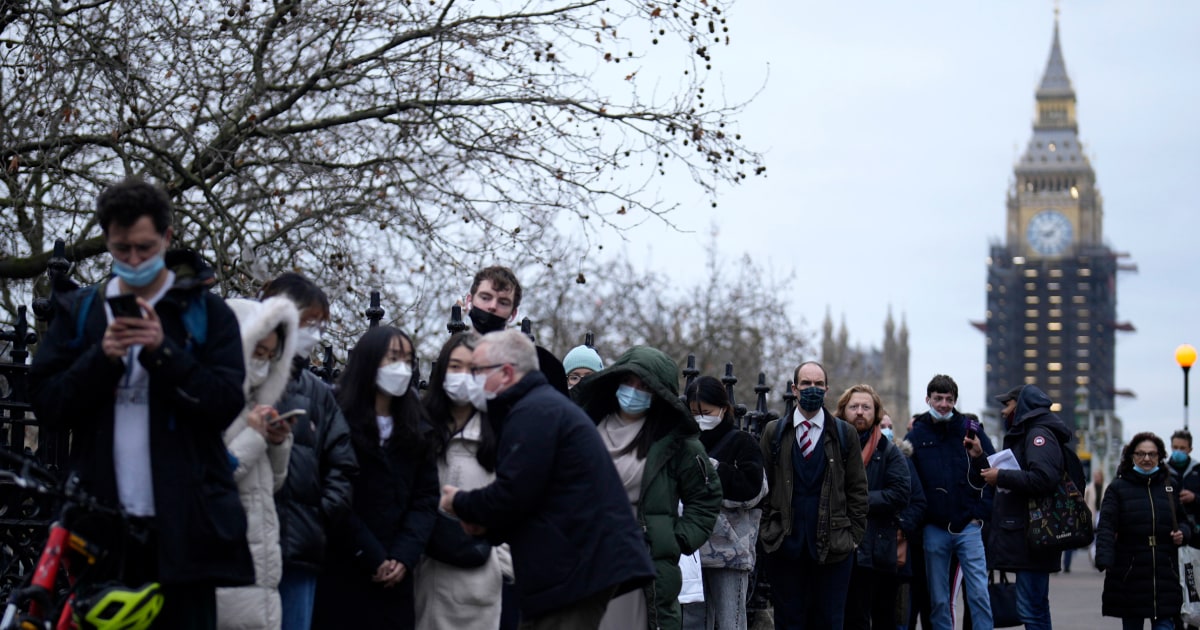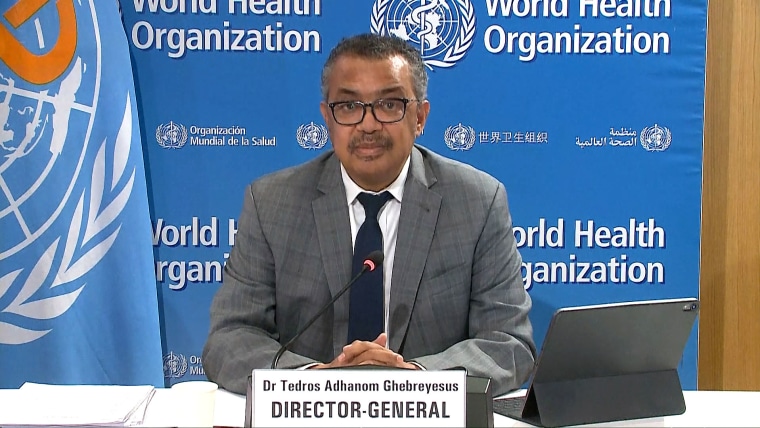LONDON — Omicron is “the most significant threat” to public health in the U.K., authorities warned Wednesday, as the World Health Organization cautioned that the highly contagious Covid-19 variant was spreading at an unprecedented rate.
The number of Covid-19 infections over the coming days will be “quite staggering” compared to previous variants, said Jenny Harries, the head of the U.K. Health Security Agency.
Hours after her warning, government data showed that 78,610 new cases had been recorded in the U.K. as of 9 a.m. local (5 a.m. ET) on Wednesday morning — the highest daily number of laboratory confirmed cases since the pandemic began.
Despite the advisories from domestic and international experts, there has been growing resistance to the British government’s new Covid-19 measures — notably from members of Prime Minister Boris Johnson’s Conservative Party.
New regulations intended to help slow the spread of omicron, including masks in public places and the use of Covid-19 passes for some venues, passed in Parliament on Tuesday evening. However, scores of Conservative lawmakers refused to back the new measures.
Some called the new measures too severe and questioned the introduction of a certificate of vaccination or proof of a negative Covid test to enter some venues.
“We are not a ‘papers, please’ society. This is not Nazi Germany,” Conservative lawmaker Marcus Fysh told BBC radio on Monday.
The comment led to pushback both in Parliament and on social media, where the term Nazi Germany trended, and Fysh later apologized for the comparison in a piece he wrote for London’s Jewish Chronicle newspaper.
Omicron’s quick spread
Just over two weeks after the first cases were detected in the U.K., omicron is now the dominant variant in London, the city’s public health chief Kevin Fenton said in a tweet Tuesday.
Since the start of the pandemic, more than 170,000 people have died in the U.K. with Covid-19, one of the highest death tolls in Europe. However, it was the first country to roll out a clinically approved Covid vaccine, and more than 68 percent of the population has been fully vaccinated. That’s ahead of the U.S., where just over 60 percent have been fully vaccinated, according to Our World in Data.
Omicron’s quick spread in Britain, with cases doubling in less than two days in most regions, came as the head of the WHO warned that measures, including masks, social distancing and ventilation, were needed alongside vaccines.
“Omicron is spreading at a rate we have not seen with any previous variant,” Director-General Tedros Adhanom Ghebreyesus wrote Tuesday on Twitter. “I need to be very clear: Vaccines alone will not get any country out of this crisis.”
In the U.S., rising cases and the fear that omicron could spark a new wave of infections led California to reimpose its indoor mask mandate for at least a month.
Europe, meanwhile, is facing a “double challenge,” with high numbers of Covid-19 infections, hospitalizations and deaths driven by the delta variant, as well as the spread of omicron, European Commission President Ursula von der Leyen said in the European Parliament. By mid-January, omicron is expected to be the dominant variant in Europe, she said.
More than 5,300 cases of omicron have been recorded in the U.K., with 10 people hospitalized. One person died after contracting the variant.
Johnson, who warned Sunday that “there is a tidal wave of omicron coming,” ramped up the country’s booster program, saying that he wants to offer all residents 18 and older a third dose to by the end of the month.
His push for boosters led to long lines at walk-in vaccination centers, with people reporting on social media that vaccines had run out before their turn came. The health service, which provides U.K. residents with free rapid Covid-19 test kits, has faced shortages on its website since Johnson’s televised address Sunday.
The U.K. administered more than 513,000 booster vaccines on Monday, its third highest rate since October.
The push for the third doses also came as the first real-world study of the variant in South Africa showed that two doses of the Pfizer-BioNTech vaccine offered reduced protection against omicron. However, the variant also appeared to cause less severe illness in South Africa, where it was first discovered last month.
The analysis, released Tuesday by South Africa’s largest health care administrator, found that on average 29 percent fewer people were being admitted to a hospital than previously with the delta variant. However, the study also found that two Pfizer jabs gave 70 percent protection against hospitalization from the new variant, compared with 90 percent seen in the delta wave.








More Stories
Heart-healthy habits linked to longer life without chronic conditions
Hoda Kotb Returns To TODAY Show After Handling Daughter’s Health Matter
Exercise 1.5 times more effective than drugs for depression, anxiety